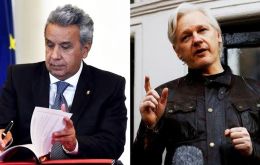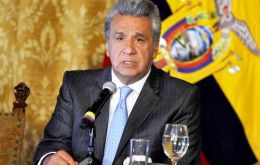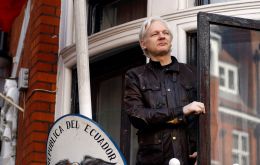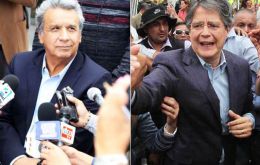MercoPress. South Atlantic News Agency
Tag: Julian Assange
-
Thursday, April 11th 2019 - 23:59 UTC
UN warns that Julian Assange would face serious violations of human rights in the US

For the United Nations (UN), the United Kingdom arrested “arbitrarily” WikiLeaks’s co-founder, Julian Assange, on Thursday and warned that by allowing his arrest, Ecuador has put the Australian journalist at risk of being extradited to the United States, “Exposing him to the risk of serious violations of human rights.”
-
Saturday, March 9th 2019 - 09:09 UTC
Ex US intelligence analyst Chelsea Manning jailed for refusing to testify on Wikeleaks

Former US intelligence analyst Chelsea Manning has been jailed for refusing to testify before an investigation into Wikileaks. A Virginia judge ordered her taken into custody until the grand jury's work is finished or she decides to testify. Manning said she shared everything she knows during her court-martial.
-
Friday, December 7th 2018 - 14:52 UTC
Ecuadorian President Lenín Moreno asks Assange to leave London embassy

After the United Kingdom has guaranteed that the founder of Wikileaks will not be extradited to the US, President Lenín Moreno invited Julian Assange to leave Ecuador's embassy in London, because his time of asylum in the diplomatic building after six years is about to run out.
-
Wednesday, October 24th 2018 - 09:13 UTC
Ecuador changes policy towards Assange: “it is a matter to be resolved between Wikileaks founder and UK”

Ecuador does not plan to intervene with the British government on behalf of WikiLeaks founder Julian Assange to negotiate a way for him to leave the country's embassy in London, where he has lived under asylum since 2012, Ecuador's foreign minister said on Tuesday.
-
Saturday, October 20th 2018 - 13:14 UTC
Assange cries humanitarian grounds and sues Ecuador over living conditions

“Julian Assange launched a case Friday accusing the government of Ecuador of violating his fundamental rights and freedoms,” read a WikiLeaks statement. The case has been slated to be heard in a domestic court next week.
-
Wednesday, July 25th 2018 - 05:20 UTC
Ecuadorean president visits UK; speculation about a deal on Julian Assange's future

Ecuador has said its president will not discuss the future of Julian Assange during a visit to the UK. Lenin Moreno was scheduled to speak in London and later travel to Scotland to the University of Edinburgh. He will also address businessmen interested in investing in Ecuador.
-
Wednesday, March 28th 2018 - 22:51 UTC
Moreno's government cuts Assange's internet access at London embassy

The Ecuadorean government of President Lenin Moreno has left Wikileaks founder Julian Assange without access to the internet at their embassy in London, it was reported Wednesday. The decision was made following Assange's recent activity on social media decrying the arrest of a Catalonian separatist leader.
-
Wednesday, February 14th 2018 - 09:58 UTC
British Judge refuses to halt legal proceedings against Assange

A British judge refused on Tuesday to halt legal proceedings against WikiLeaks founder Julian Assange for jumping bail and fleeing to the Ecuadorean embassy in London in June 2012. The ruling leaves Assange, 46, in a legal and diplomatic impasse, with no way out of the embassy where he has lived for almost six years, unless he decides to face the prospect of arrest by British police.
-
Friday, January 12th 2018 - 10:16 UTC
Foreign Office rejects Ecuadorean diplomatic status for Wikileaks Julian Assange

The British Foreign Office rejected an Ecuadorian government request to grant the WikiLeaks founder Julian Assange diplomatic status in a bid to bring to an end his forced stay in the South American country’s London embassy.
-
Saturday, April 1st 2017 - 23:40 UTC
Will Ecuador confirm the conservative-turn-tendency in South America?

Voters in Ecuador will be going to the polls on Sunday for the presidential runoff and a choice between a traditional South American leftist and a conservative ex-banker, that will steer the oil exporting country for the next four years. It will also show if South Americans are effectively abandoning populist ideas as happened in Argentina, Peru and Brazil.
